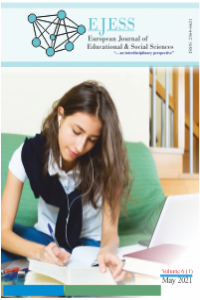Exploring Human Potential: Psychical experience in the Light of Some personal and Demographical Variables
Exploring Human Potential: Psychical experience in the Light of Some personal and Demographical Variables
Psychical experiences (Psi), personal-demographical variables, psi map, belief in psi, psychology, sociolog, religion, personality, cognitive, paranormal, telepathy, gender, déjà vu, Psychokinesis, extra-sensory perception Arabic countries,
___
- Breen, M. (2011). Paranormal phenomena report, how paranormal experience impact our lives. Psychic revolution. https://psychicrevolution.com/2011-Paranormal-Activity. Last visit, March 7, 2018.
- Castro, M., Burrows, R. and Wooffitt, R. (2014). The Paranormal is (still) Normal: The Sociological Implications of a Survey of Paranormal Experiences in Great Britain. Sociological research online, 19(3), 16. DOI: 10.5153/sro.3355.
- Drinkwater, K., Dagnall, N., Bate, L. (2013). Into the Unknown: Using Interpretative Phenomenological Analysis to Explore Personal Accounts of Paranormal Experiences. Journal of parapsychology, 77(2), 281-294.
- Encyclopaedia of Psychology. (2018). Perception. Copyright 2001. Gale Group. Retrieved on Jan. 12, 2018 http://www.encyclopedia.com/social-sciences/.
- Goulding, A., Parker, A. (2001). Finding psi in the paranormal: Psychometric measures used in research on paranormal beliefs/experiences and in research on psi-ability. European Journal of Parapsychology, 16, 73-101.
- Hui, C.H. (2010). Extra Sensory Perception (ESP), Encyclopaedia of psychology and Religion. Springer, Boston, MA. DOI: http://doi.org/10.1007/978-0-387-71802-6_214. Last visit: Feb.15, 2018.
- Irwin, H. (2015). Paranormal Attributions for Anomalous Pictures: A Validation of the Survey of Anomalous Experiences. January 2015. Paranormal Attributions for Anomalous Pictures. Journal of the Society for Psychical Research, 79(1), 918.
- Irwin, H., Dagnall, N. and Drinkwater, K. (2016). Dispositional Skepticism, Attitudes to Science, and Belief in the Paranormal. Australian journal of parapsychology, 16(2), 117-131. ISSN: 1445-2308.
- Montanelli, D. and Parra, A. (2008). Are Spontaneous Anomalous/Paranormal Experiences Disturbing? : A Survey among Under-graduate Students. International journal of parapsychology, 13, 1-14.. ISSN: 0553-206x, New York, NY, USA.
- Parra, A. and Luis, P. (2010). Extrasensory Experience and Hullucinatory Experience: Comparison Between Two Non-Clinical Samples Linked With Psychology Measures. Journal of the society of psychical research, 47(900), 145-155. .
- Parra, A. (2015). Personality Traits Associated with Premonition Experience: Neuroticism, Extroversion, Empathy and Schizotypy. Journal of the society of psychical research, 79(918), 1-10.
- Perdue, A. (2013). The Relationship between the Big Personality Traits and Paranormal Belief. PhD. Thesis, University of Central Florida, Orlando.
- Psi encyclopaedia, (2018): Psychology and parapsychology, http://psi-encyclopedia.spr.ac.uk/articles/psychology-and-parapsychology Last visit: Feb.15, 2018.
- Storm, L. and Thalbourne, A. (2005). The Effect of a Change in Pro Attitude on
- Paranormal Performance: A Pilot Study Using Naïve and Sophisticated Skeptics. Journal of scientific exploration, 19(1), 11-29.
- Xiong, J. H. (2010). The outline of parapsychology. University press of America. ISBN: 978-0-7618-4945-2. Pages 83-86.
- Zahran, S. (2011). Some Personal and Social Variables That Affect Extra Sensory Perception (Sixth Sense). Psychology, 2(4), 388-392. DOI:10.4236/psych.2011.
- Zahran, S. (2017). What is Psi? From Anti-Parapsychology to Psi as a Next Scientific Revolution: Theoretical Reviews and Hypothesized Vision. American Journal of Applied Psychology, 5(2), 33-44. DOI: 10.12691/ajap-5-2-1.
- Yayın Aralığı: Yılda 2 Sayı
- Başlangıç: 2016
- Yayıncı: Ali KORKUT
Approaches on The Future of Turkey Tourism in 2023
Abdurrahim EMHAN, Vakkas ARSLAN, Mehmet Fatih YAŞAR, Sezgin ÇOCUK
Financial Analyses Statements of Company “X” LLC
Prospects and Challenges of Sustainable Rice Production in Igbemo Ekiti, Southwest Nigeria
Johnson Olaosebikan AREMU, Bolarinwa AKİNWAMİDE
Bulanık Mantık ile Klasik ve Sembolik Mantık İlişkisi (Karşılaştırılması)
An Analysis of the State of Ughoton after the British Invasion of 1897
